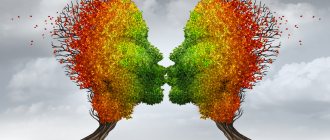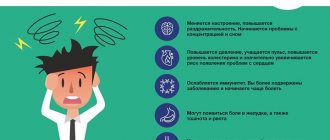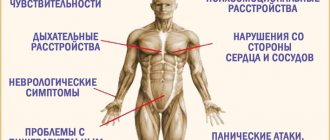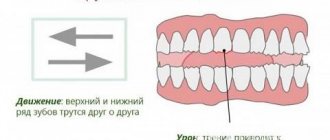Why do seasonal exacerbations of gastritis occur?
Scientists argue about the reasons for the exacerbation in the off-season. Some experts point out that in the spring the production of hydrochloric acid in the stomach increases. Others recall that at this time the Helicobacter bacterium is activated, which is now believed to cause gastritis and peptic ulcers of the stomach and duodenum.
Gastritis is one of the most common gastroenterological problems, especially in the autumn-spring period.
Finally, the third explanation is the seasonal lack of vitamins C and B in the diet - without them, the process of natural renewal of the mucous membrane slows down.
There is no universal answer to this question. In spring, the human body renews itself. But by the end of winter, many people experience a lack of vitamins in their bodies and their immunity weakens. At this time, a person’s daily diet lacks fresh fruits and vegetables. All this causes exacerbation of gastric diseases.
Often the course of diseases of the gastrointestinal tract is influenced by the psyche: the spring exacerbation of these ailments occurs almost simultaneously. Under stress and anxiety, the body’s adjustment to digesting food occurs with malfunctions, because it is the brain that is responsible for the signals that the stomach, liver, intestines and other organs receive.
If a person does not have a predisposition to diseases of the gastrointestinal tract, then most likely he will never have an ulcer, even with high stress loads and poor nutrition. Popular wisdom says about this: “A healthy stomach can digest a nail.” Conversely, if there is a predisposition, then any of the above factors can become a trigger for peptic ulcer or gastritis.
Preventative therapy
When is it better to carry out preventive treatment: during the “threatened” period (spring and autumn) or in the period preceding a possible recurrence (relapse) of the disease? Guided only by the seasonality of exacerbation of the disease, in terms of the timing of preventive (anti-relapse) therapy, you can be late.
Therefore, patients with peptic ulcer disease need to undergo preventive treatment both during seasonal exacerbations and during the period of the individual most likely recurrence of the disease in each patient. It is important to remember when the ulcer flared up in previous years and repeat prevention for at least 5 years.
The slightest push from the outside (stress, fatigue, colds, medications, nutritional disorders) - and a mismatch between the “aggressive factors” and “protective factors” of the gastric and duodenal mucosa occurs, and an ulcer may worsen.
It is possible to change the course of the disease to a more favorable one by preventing repeated exacerbations.
As for the duration of the course of treatment itself, it should last on average at least 3-4 weeks. Depending on the course of the peptic ulcer, age, concomitant diseases, complications, preventive therapy is tailored individually, both in terms of the volume of medications and the duration of treatment.
Since anti-inflammatory non-steroidal drugs aspirin, Voltaren, Brufen often turn out to be provocateurs of “medicinal ulcers”, first of all, they must be excluded from use.
Although the true origin of peptic ulcer disease still remains a mystery, it is known that it is based on a violation of the nervous regulation of the stomach. As a rule, ulcer sufferers are easily excitable, suspicious people with changeable moods. Psycho-emotional correction is the most important condition for proper treatment. Stress and negative experiences are the best stimulants for exacerbation of ulcers. Taking this into account, it is recommended to always keep motherwort and valerian in your home medicine cabinet. Calming herbs will help relieve nervous tension without side effects.
Gastritis and spring
Gastritis is one of the most common gastroenterological problems, especially in the autumn-spring period - as the period of exacerbation of these diseases, because it is a transition period for the body.
It is difficult for the stomach to switch from a winter heavy fatty diet to a light spring diet. In addition, vitamin deficiency and depression often occur in the spring, which also increases the risk. At this point, any failure of diet, diet, poor quality nutrition, or stress can provoke an exacerbation of this process. Diet is very important.
The main reasons for the development of gastritis in spring are:
- weakening of the body's protective properties, the bacteria Helicobacter pylori (Helicobacter pylori);
- vitamin deficiency (lack of useful nutrients);
- unbalanced diet;
- change in the concentration of gastric juice;
- weak motor activity;
- frequent nervous conditions, etc.
If you have already developed chronic gastritis, then it is likely that in March April it will remind itself
Why does exacerbation of gastritis occur in spring?
If you have already developed chronic gastritis, then it is likely that in March-April it will remind itself. There are several reasons for this. Firstly, a general weakening of the body after winter, caused by a lack of vitamins, sunlight and physical inactivity.
Secondly, in the spring the daily routine changes: the days become longer, the nights become shorter, this is also stress for the body, which leads to a weakening of defense mechanisms. The diet is also changing: more vegetables and fruits containing coarse fiber appear in the diet, which can irritate the gastric mucosa. In the spring, the stomach is also subject to other stresses: Orthodox Christians observe Lent, and girls and women go on restrictive diets to lose weight by summer.
Spring is the time of exacerbation of gastritis, symptoms of exacerbation
With the onset of spring, the whole body undergoes a restructuring. In addition, after the winter period with colds and flu, immunity decreases. Therefore, even minor physical or emotional stress can lead to exacerbation of chronic diseases, including gastritis. The risk of its first manifestations is higher.
In the spring, many chronic diseases can worsen, including diseases of the gastrointestinal tract.
At first, its symptoms are not too obvious. A person, after eating dry food, after eating fatty, spicy, too hot or rich food, feels a burning sensation in the epigastric region, he experiences heartburn, belching, and drooling. He notices that he feels full faster and his appetite decreases, but he attributes this to unhealthy food or an incorrect diet.
And these may be the first symptoms of developing gastritis. Moreover, the disease often begins to manifest itself with one or three symptoms. Therefore, the most correct thing in such a situation is not to self-medicate, but to contact a gastroenterologist. He will prescribe tests and select a treatment regimen.
Prevention of gastritis in spring
We make sure that nutrition is correct and regular. We minimize the load on the nervous system. We dress according to the weather and do not get hypothermic. Don't forget about regular walks in the fresh air and feasible physical activity. We remember to alternate work and rest. For preventive purposes, you can drink herbal soothing teas or tinctures. Natural preparations based on flax seeds, plantain, fennel, mint, chamomile, and ginger root have proven themselves well in the fight against gastrointestinal ailments.
How mental illness behaves during seasonal changes
It is generally accepted that during the so-called off-season period, not only physical ailments worsen, but also mental illnesses, in particular mental illnesses. Most psychological diseases are chronic; the course of the disease can be affected by various circumstances, in particular, seasonal changes. Mental illnesses can be especially acute in the fall and spring if other factors intervene, for example, if the patient independently changed or stopped taking the prescribed medication, if he lost the support of his psychologist or psychotherapist, and also if the person experienced acute psychological trauma. In particular, if a person with mental illness has been exposed to mental trauma, then a “mess” begins in his subconscious and he may begin or continue to abuse alcohol, as well as psychoactive substances, which introduce an imbalance during the period of treatment.
Simple autumn depression, which is accompanied by a number of other factors, can lead to deep pathological forms of illness. In particular, pregnancy, childbirth, and postpartum depression can lead to the development of exacerbation of mental illness in women; in men, such factors can be the loss of a job or a loved one, or a personal physical illness.
You should talk in more detail about mental illnesses such as neurosis, psychosis and schizophrenia. If the above diseases are neglected, they can lead to disastrous consequences, in particular, suicide.
Nervous exhaustion of the body leads to the appearance of psychoses and neuroses. Like any disease, a mental disorder can begin at the everyday level, accompanied by anxiety and discomfort in the body. The presence of neurosis means that it is time for a person to register with the appropriate medical institution. The sooner the healing process begins, the faster anxiety, epilepsy and other effects on the body will disappear.
The initial form of mental illness is neurosis. When it “settles” in the body and soul of a person, it is difficult to determine on your own, because as a rule there are a number of reasons for this, which, merging together, lead to the appearance of the disease. A psychotherapist will help determine when and at what point the patient acquired a mental illness, who, after lengthy conversations and a series of manipulations, will help determine the severity of the disease.
Just don’t confuse a psychotherapist with a psychologist, because psychologists work with mentally healthy people who have temporary difficulties and get stuck in a particular situation. But psychotherapists, and specifically the field of psychiatry, work with people who are overcome by mental illness.
One of the most severe is schizophrenia. Looking at the insanity of the modern world, at first glance it may seem that there are many schizophrenics around who, in one way or another, ruin both their lives and the lives of the people around them. In the minds of schizophrenics, various disturbing images constantly or periodically pop up that have already happened in their lives and they are trying to survive them, or bitter events that have been invented and exaggerated to the point of impossibility. With their unconscious actions, they can cause harm to people, animals and all other living and non-living organisms. People suffering from schizophrenia experience spring and autumn exacerbations. I would like to emphasize the fact that the symptoms and schizophrenia itself cannot be completely treated; it only weakens thanks to properly selected medications. People suffering from schizophrenia due to their illness do not see a problem in themselves; it seems to them that everyone around them is sick except themselves. As a rule, such patients are treated as inpatients in hospitals, because during home treatment they may simply stop taking the necessary medications. When patients with severe forms of illness are at home, for some reason their self-confidence simply runs out and they do not recognize their illness.
It is worth emphasizing that if in your family or simply close circle there are people whose psyche is disturbed and they suffer from mental illness, then they need your support and, depending on the form of the disease, in the absence of contradictions. You cannot put pressure on such people, because a carelessly spoken word or action, which at first glance does not carry any harm, can cause ambiguous reactions in people with mental illnesses. Your task is to protect yourself from the influence of such people on your life, if it is then impossible to at least make their existence in this mortal world easier. Unfortunately, it so happens that even the most minimally traumatic event in life can lead to unpredictable consequences.
Exacerbation of chronic gastritis in spring
In the spring, many chronic diseases can worsen, including diseases of the gastrointestinal tract. The stomach of a sick person always reacts very quickly to sudden weather changes. In spring, the feeling of hunger increases, flatulence and heartburn may appear. In the spring, many chronic diseases can worsen, including diseases of the gastrointestinal tract.
Exacerbation of chronic gastritis in the off-season reasons
Exacerbation of gastritis in the fall is influenced by hard work, leading to nervous disorders, stress and depression. All these factors also affect the digestive system: disruption of the digestion and absorption of food occurs. Most often in the spring, gastritis worsens due to poor diet or poisoning. It is also not without the influence of hypothermia or psychological stress.
Symptoms of exacerbation of chronic gastritis in spring
Chronic gastritis can be asymptomatic, or with periods of exacerbations and remissions. Exacerbations are seasonal (spring, autumn). During periods of exacerbation, the patient has local symptoms and general disorders.
Most often in the spring, gastritis worsens due to poor diet or poisoning
Local disorders of chronic gastritis against the background of spring are characterized by dyspepsia (heartburn, belching, perhaps nausea), epigastric pain, and loss of appetite. Heartburn and belching occur soon after eating. Against this background, patients develop an unpleasant taste in the mouth.
Epigastric pain can be aching or intense, occurring immediately or 15 minutes after eating. The pain is associated with damage to the gastric mucosa and stretching of the stomach walls. Sometimes the equivalent of epigastric pain can be a burning sensation. Intense pain in the stomach may be accompanied by vomiting, which brings relief. If patients have high acidity in the stomach, then with exacerbation of gastritis there may be loose stools and rumbling in the stomach.
More often, exacerbation of chronic gastritis is accompanied by asthenia (general weakness) and low-grade fever. Epigastric pain may be accompanied by palpitations and cardialgia after eating.
What to do in case of exacerbation of chronic gastritis in spring recommendations
You should take care of your diet. You need to set up a schedule, eat at the same time, three to five times a day. It is not recommended to overeat, especially before bed. It is also advisable to exclude from the diet foods that can harm the gastrointestinal tract: fried, smoked, fatty. You should limit your consumption of spices, and it is best to eat bland food, but rich in calories. Replace bread with crackers and biscuits.
Products such as semolina porridge, low-fat dairy products, and brown rice are very good for a spring diet. It is advisable to stop drinking coffee and tea. Drink plain water without gases or dried fruit compotes. Most spring fruits and vegetables cause stomach irritation. In the spring, leave only high-quality bananas in your fruit diet.
For gastritis, physical exercise is useful, especially to strengthen the abdominal muscles (for example, “bicycle”: lying on your back, alternately bend and straighten your legs). They increase metabolism, improve blood circulation and activate the digestive system. Carry out therapeutic exercises slowly, before meals or two hours after it.
When you have gastritis, and there is no painkiller at hand, lie on your side, slightly pulling your knees towards your stomach. This pose allows you to relax the muscles as much as possible, and the pain subsides. If it doesn’t feel better, place a heating pad or a bottle of cold water on your stomach. And if the attack is accompanied by cramps and nausea, suck on a piece of ice or a slice of lemon.
What symptoms should you pay attention to?
You experience a loss of strength, become irritable, and get tired quickly. I constantly want to sleep, apathy appears. Headaches or dizziness occur. All these are the consequences of body fatigue after a long winter and adaptation to new weather conditions.
But sometimes the reason for poor health is much more serious: all these signs may indicate a special type of depression, seasonal affective disorder. The disease usually manifests itself in the autumn-winter period, but can worsen in the spring.
Seasonal depression differs from spring exacerbation in that it is much more severe. Its symptoms include:
- depressed state for a long time;
- loss of interest in things and activities that previously brought pleasure;
- lack of energy;
- irritability and tearfulness;
- difficulty concentrating.
Insomnia, loss of appetite, weight loss, and increased anxiety may also indicate seasonal affective disorder.
Why does gastritis worsen in autumn and spring?
Recurrence of gastritis usually occurs in spring or autumn. Poor diet, stress, smoking and alcohol can also be the cause. This is facilitated by a change in temperature and a decrease in immunity, especially on the eve of winter. In spring, more seasonal vegetables and fruits are consumed, and they can also cause inflammation of the gastric mucosa.
Treatment of aggravated gastritis is not only about pain relief. Since exacerbations of chronic gastritis are often provoked by colonies of Helicobacter pylori bacteria, antibiotics are mandatory. If chronic gastritis in the acute stage is not properly treated, it can develop into a stomach ulcer.
What drugs are prescribed for seasonal exacerbation of gastritis?
When exacerbating gastritis in the off-season, it is important to follow proper nutrition.
To relieve pain during exacerbation of gastritis with low or high acidity, only a doctor prescribes a certain list of medications. How to relieve symptoms of exacerbation of gastritis? These can be antacids and antispasmodics.
Typically, patients are prescribed to take Phosphalugel, Rennie, Gaviscon, Almagel, Maalox. They envelop the walls of the stomach, thereby relieving pain. Release form: tablets, syrups, suspensions. No-spa is considered a popular antispasmodic. It is often prescribed in hospital as an injection to relieve pain.
Preventive measures for seasonal exacerbation of gastritis
Why is prevention of this disease so important in today’s lifestyle? By adhering to a proper diet, giving preference to healthy foods with the least amount of preservatives and dyes, and moderate alcohol consumption, you can avoid this disease.
It is important to remember that you cannot ignore the body’s signals about impending disturbances in the functioning of the stomach. Prevention of exacerbations in the autumn-spring periods is based on taking appropriate tablets. This will allow you to promptly prevent exacerbation of gastritis and avoid taking painkillers again.
Sources:
- https://www.molnet.ru/mos/ru/hospitals/o_646600
- https://vitbiomedplus.ru/blog/obostrenie-gastrita
- https://kazved.ru/news/health/21-03-2019/kovarnyy-gastrit-chem-opasno-eto-zabolevanie-5703259
- https://gastritinform.ru/xn--80adrcqmq1d.xn--p1ai/patient/section/khronicheskiy_gastrit/
- https://plitkar.com.ua/obostrenie-gastrita-i-dieta-snizhajushhaja-risk-vospalenija-zheludka/
- https://medqueen.com/specialistam/praktika/praktika-statya/1278-simptomy-i-lechenie-obostreniya-gastrita.html
Post Views: 707
Mass psychosis
PHOTO:
People meet, people fall in love, get married, get divorced, have rows, throw a piano out the window, kick their wives, children and husbands out of the house, quarrel with their parents, quit their jobs, go crazy, go on a binge, come out of a binge, play tricks and be obscurantist without coming into consciousness, and they are not going to finish it until spring (and then everything will be all over again). Cool, we stocked up on popcorn! More hell!












